A bear attacked and bit a staff at a wildlife adventure resort in Pennsylvania, the resort said.
The bear attack took place at Nemacolin Woodlands Resort in Farmington, Pennsylvania, about 60 miles south of Pittsburgh. On the morning of July 20, a Himalayan bear reached through a wire fence to pull a female staff toward itself and bit the staff’s arm, said the resort in a statement.

“There were two levels of wire fencing at the bear enclosure, and the associate was standing between the two when the incident occurred,” the statement said.
Responders engaged the animal in order to free the staff member. Afterward, the victim was stabilized by a nurse and flown by helicopter to a nearby medical center.
On Sunday afternoon, a spokesperson from West Virginia University Medical Center confirmed that the woman, whose name remains unreleased, is still in critical condition at Ruby Memorial Hospital in Morgantown, Pennsylvania, reported WTAE Pittsburgh.
“We deeply regret this incident,” Maggie Hardy Knox, president of Nemacolin Woodlands Resort, said in the statement. “Our thoughts are with our injured associate, and our staff and guests, as we focus on ensuring they receive the finest medical attention and counseling.”
Nemacolin Woodlands employee bitten by Himalayan black bear in zoo https://t.co/aImHAsW2mN
— Pittsburgh Post-Gazette (@PittsburghPG) July 20, 2019
The Pennsylvania Game Commission was at the scene following the attack, reported Pittsburgh Post-Gazette. The bear was not put down but has been isolated within the bear enclosure. The zoo remains open and the investigation into what occurred is still ongoing.
The resort features a safari tour that allows visitors to get “close and personal” with some of the Wild Academy’s animals. Visitors can feed and pet various breeds of sheep, cows, and goats before feeding the wolves, tigers, lions, and buffalo. The advertisement that reads “Don’t forget the bear enclosure, where we hear the bears enjoy eating marshmallows” has been taken down from the resort’s website since the bear attack.
Assam: Two Himalayan Black Bear cubs have been born at Assam State Zoo cum Botanical Garden, in Guwahati. pic.twitter.com/faCUHO95wt
— ANI (@ANI) April 4, 2019
Himalayan black bears are not native to the Americas, as the name suggests. They can be found across the foothills of the Himalayas ranging from Pakistan to Tibet, according to the World Wildlife Fund. A subspecies of the Asiatic black bear, they have long black fur with a distinct white patch on the chest that is often shaped like a crescent.
As omnivorous animals, Himalayan black bears eat a very diverse diet, which consists of grasses, herbs, fruits, nuts including acorns, pine nuts, larvae, invertebrates, termites, small mammals, eggs, bees, and honey. When food is scarce, they may turn to prey on livestock such as sheep, goats, and cattle, according to Bear Conservation. On average, they can grow up to around 6.5 feet in length and weight from 400 to 770 pounds.
Due to poaching and increasingly shrinking habitats, the Himalayan black bear is listed as vulnerable on the International Union for Conservation of Nature’s Red List of Threatened Species.

